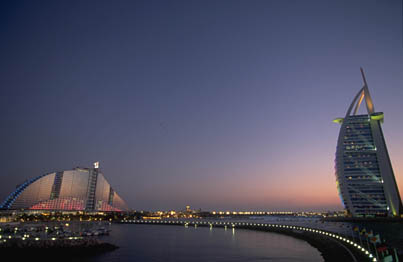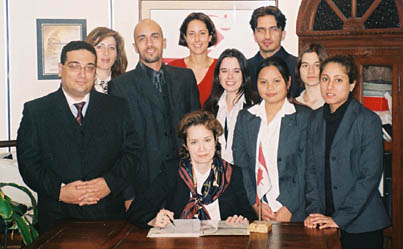Shifting Sands (Page 2)

Dubai in the evening, including the tallest hotel in the world, the Burj Al Arab at right.
Photo: © Christine Osborne / CORBIS / MAGMA
Canadian Presence
The offices of Mathieu's law firm are located in the same office tower as the Canadian consulate - a convenient marketing advantage for a firm that helps make connections between Canada and Dubai in business, immigration or family law. Her suite is small by Canadian law standards, just enough room for the six lawyers and eight support staff in her firm - a cosmopolitan mix of cultures that includes British, Indian and Syrian expatriates. While the firm's blend of nationalities may be typical of Dubai's population - 80% of the roughly 900,000 inhabitants are non-UAE nationals - the gender balance is not. Women in Dubai form just under 30% of the population.
The Canadian flag, the map of Canada and the Charter of Rights and Freedoms that adorn the walls proclaim Mathieu's strong connections to the country of her birth and her national pride. In fact, colleagues describe her as one of this country's biggest boosters in Dubai.
"She's a real ally for Canadian business," says Anne Argyris, Canada's Consul General in Dubai. "She has a lot of enthusiasm when it comes to encouraging Canadian companies looking to establish themselves in the region."
Mathieu's passion for her profession is reflected in her activities outside the office. She is past chair and executive member of the Canada Business Council of Dubai and the Northern Emirates and is often called upon to speak to visiting delegations of Canadian business people who come to Dubai to explore business opportunities.
"My job is to raise red flags and give people all the pros and all the cons," she says. "While it may look like Europe or in some places Miami Beach, this is still the Middle East. You have to respect the culture, be aware of the slower pace of business and always be mindful that not everything that shines is gold.
"It is a great place to do business, but you have to invest the time and effort, do the research, choose carefully who you work with and establish relationships that prove you are worthy of their trust."
That same approach to doing business in the Middle East has guided Mathieu in the development of her legal practice. It's taken ten years to build a firm that specializes in making business relationships happen. Like the advice she offers to visiting business people, she notes that the legal professional also operates to the beat of a different drummer.
"In Canada you're trained to rely on jurisprudence, rushing off to the law library to look up precedents in case law. Here you have to get used to practising without the reference books. It's a bit like walking a high wire without a net and your legs shake for a while, but you become accustomed to it.
"I find the practice of law here less adversarial and more constructive. It's more like ‘let's solve this problem' and because it's constructive, you feel like you are contributing to the growth of the country."
She points out that the most serious crimes have to do with money.
"Writing a cheque that doesn't get honoured is considered a criminal act, and the person who writes the cheque can end up in jail," she warns. "It's better not to write the cheque in the first place and negotiate repayment terms."
Only a tiny fraction of Mathieu's cases go to litigation. In fact, she says many disputes are solved through compromise even before the other side knows you have retained a lawyer.
"If you engage a lawyer right off the top to work on your behalf, they take it personally and don't trust you," she points out. "I advise my clients not to engage me initially and instead I provide them with a strategy to bring to their negotiations, and I follow up with the paperwork once a deal has been reached."
As a new country (the UAE was founded in 1971 and was formerly a British protectorate known as the Trucial States), the legal system is still working out a few of the kinks. For instance, the rates that lawyers charge vary widely. Often fees are negotiated based on what you can afford, a flat rate based on the work involved or a fixed amount of what is being claimed in a lawsuit, regardless of the outcome. An hourly rate at Mathieu's firm averages about $250 an hour.
"It's a very diversified practice," Mathieu says of her firm. "I handle successions, wills, some tax advice, family law and divorce, as well as commercial and immigration law. But we don't do criminal law."
From the immigration standpoint, Mathieu's firm is well-respected because of her straightforward approach with her clients. "If someone doesn't qualify I tell them they don't qualify right off the bat," she says. "I have to be accountable to my profession."
Even though property ownership laws have been relaxed to allow foreigners to own real estate, the population in Dubai is still relatively transient. Permanent residency and citizenship are not available to expatriates. As a result, there is a steady flow of people in both the professional and investor class who look to Mathieu's firm for immigration advice.
"Canada has always been highly regarded by potential migrants and recent events have deepened the feeling that Canada is a good place to settle."
Business Flocks to Dubai
Most of Mathieu's time and effort is taken up with encouraging people and businesses from countries like Canada to come to Dubai. Even though many European countries have been investing in the region for decades, she says there is still a wealth of opportunities for Canadians. "We missed part of the boat already. There is still a part to catch, but you've got to be here. The most important thing is to establish your credibility and get people to trust you."
The list of Canadian companies doing business in Dubai is an impressive one and includes firms like Bombardier, CAE, McCain, SNC Lavalin, Giffels-Norr, Cansult, Royal Building Technologies and retailers like La Senza, Second Cup and Aldo Shoes. And more companies are coming all the time.
"Dubai is a long way from Canada and it takes guts to come here," says Mathieu. "But if you have a long-term vision, it almost always pays off. I'm excited about the future here. The government says that the recent projects they've announced, including the largest indoor ski slope in the world, the tallest building in the world, and the new financial centre, represent only 5% of Dubai's master plan. So we're still in the early stages of Dubai's development and there are clearly a lot of opportunities for anyone willing to take an interest and invest some time here."
Does she miss Canada?
"Although I live in a fantastic country and I've been able to travel extensively, I still miss the soul of Canada, especially summers in Montreal with the culture, the summer festivals and the people." So every summer and every Christmas, Mathieu returns to Montreal to recapture that feeling and to give her daughter the sense that "Canada is her ultimate home and not only the place we visit twice a year."

Mathieu and her legal team in their Dubai offices.
Courtesy Hélène Mathieu


